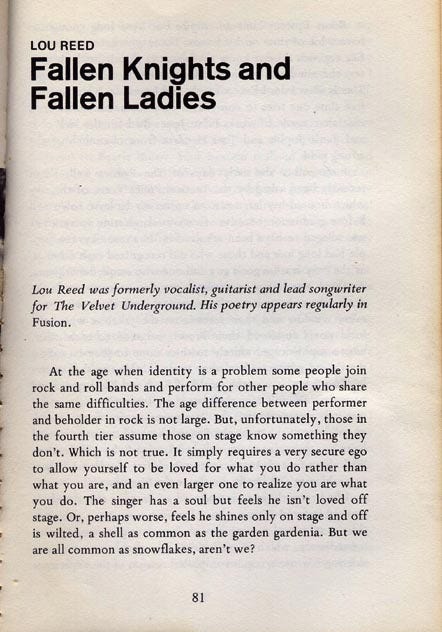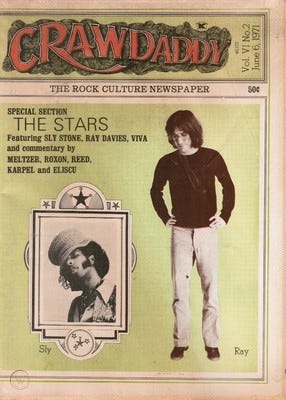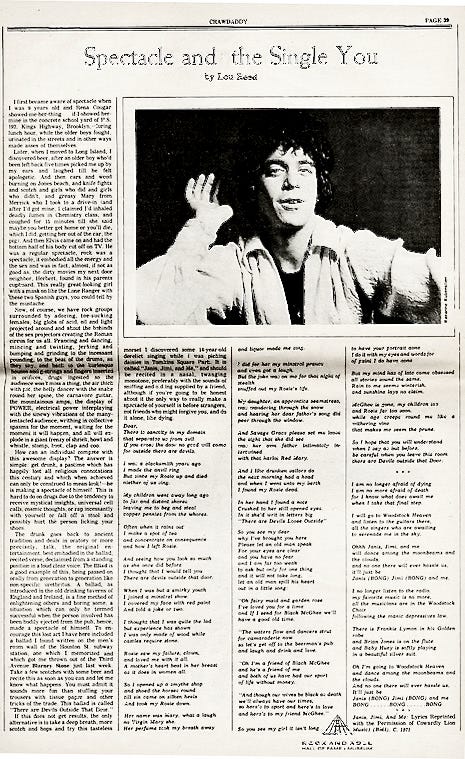Lou Reed's Missing Essay (Which I Edited)
A new book details his early "retirement" from music, but here's something left out, plus a fun poem.
Greg Mitchell is the author of a dozen books and now writer/director of award-winning films. He was also the longtime executive editor of the legendary Crawdaddy. This newsletter somehow remains free when you subscribe. His film “Atomic Cover-up” became free via Kanopy this month.
There’s a fine excerpt in The New York Times today by Will Hermes from an upcoming bio of Lou Reed, focusing on the final shows of the Velvet Underground at Max’s in August 1970 which climaxed with Lou driving off with his parents to their home on Long Island and his brief retirement from music.
As it happens, I attended one of those series of ten gigs at Max’s (SRO, in the back of the smallish room upstairs), as I had just moved to New York and started working at career incubator Zygote. It was a much-hyped event but close to our office and not as tough to get into as it might seem. Bootlegs followed. The excerpt recounts Lou’s disappointment that the band, despite its influence, never broke through commercially, and now missing John Cale—thanks to Reed giving him the boot (and not in the “Venus in Furs” manner). Of course, their belated Live ‘69 double-lp album remains one of the greatest concert albums ever.
Lou, as long known, stayed mainly with his folks for awhile and even worked as typist in his dad’s accounting office. He vowed to stick to poetry and prose. At the very end of 1970 he contributed an essay (see below) for a book, No One Waved Goodbye, put together by the editor of Fusion (a Boston-based music magazine), Robert Somma. Lou’s piece hailed, and sometimes found fault with, Jimi Hendrix, Brian Jones, Brian Epstein, Janis Joplin and more.
By March 1971, I had been hired to revive the now-dormant Crawdaddy, which had paved the way for Fusion and Zygote, not to mention Rolling Stone, back in 1966 under Paul Williams. A few months later, Lou (after finding his poetry under-appreciated) quite predictably returned to music, recording some demos with one of our regular columnists, Richard Robinson, aided by his wife, another Crawdaddy contributor, Lisa Robinson. This led, down the road a bit, to his hit single “Walk on the Wild Side” and album Transformer.
What’s missing in the Times excerpt, and everything else I’ve seen published about Lou—and even, it seems, from his papers at the New York Public Library—is an essay he contributed to Crawdaddy in April 1971, before his return to music.
By then, photographer Raeanne Robinson had been hired to take the reins at Crawdaddy but I stayed on as her #2. We put together what we called a special “The Trouble With Stars” issue. I contributed half of a cover story, on my interview with a (very) disturbed Ray Davies, while the other half was handled by my Zygote comrade Peter Knobler, an amazing confrontation with a druggy Sly Stone.
Other pieces, which I edited, included a silly essay by Lillian Roxon claiming that “we” (that is, rock critics) were now the true stars, as she name-checked Greil Marcus, Lenny Kaye and Richard Meltzer, among others. Well, it’s true, Lenny had just started playing guitar behind former Crawdaddy record reviewer Patti Smith at poetry performances, but still….
Lou’s contribution was an essay under the title, “Why I Wouldn’t Want My Son To Be a Rock Star, Or a Dog Even.” He observed, among other witticisms, that “the first Neanderthal who discovered echo must have felt akin to our star with his first amp.” Also: “Today, even Katharine Hepburn, who is a real lady, is not a star since: 1) She is not male 2) She does not play guitar or piano 3) She is not vulgar 4) She does not take acid 5) She wears bell bottoms only on holidays.”
On a more serious note, he recalled an unnamed poet friend (likely Delmore Schwartz, his mentor at Syracuse U) who “was a drunk” but “thought he was Hamlet” and “died quite ignominiously in the Hotel Dixie after a drinking bout.” He was “a real star…but since he did not act like a star no one believed him.”
What does it mean to be a rock and roll star, a far-reaching orb from another galaxy, a forthright example of eco-socio-political sexuality embracing most parts of the Western Hemisphere and even some of China?….To be a star, ah a Musician, and best yet to die at 23 or 4, give or take a month, in the full blaze of power or just a little downhill but anyway die peacefully preferably O.D., or by some rare sex disease?
His conclusion: “perhaps it is better to act like a star than to be a star since real ones seem to die or go incurably insane.” That’s partly because stars “want to be loved by God. This often leads to calamity and insanity as some people say there is no God and therefore possibly no stars. Better to die young than to find this out.”
And being a star also means you get fucked. Not only by groupies, male, female, and neutral, but by family, friends, promoters, record company men and managers. Especially managers….Anyway, stars should watch what they sign, since contracts are from 3 to 5 years, with options, and cannot be gotten out of on the pretext of no sober witnesses. Only if you cannot speak English can you get out of an English-speaking contract.
But think if you do sign: the girls, the drugs, oooh the drugs, adulation, light shows…a Laurel Canyon retreat… existential dilemmas, alienation,and with any kind of luck, your life.
Therefore, it’s no surprise, when “you’re young and handsome or perhaps sweetly deformed, and you’re in high school and hate your teachers and hear booming over the radio music you love and jump to and know you too could play, and buy an old Gibson, a Les Paul, you saved up 2 years for and you practice the blues cause that’s where it’s at…you realize that you too could one day have your billboard plastered across Time Square and have all the girls, power, money…a good guy roadie…a loving manager…a hit record and a double album with your face inside….if you can get all this, then you deserve to be a star and deserve to say anything you want.
“Or not say anything at all.”
Nevertheless, Lou still had more to say, and a few weeks later, in our July 4, 1971, edition, with Alice Cooper on the cover, we published a very odd contribution from him—also missing in the Reed canon—which starts as another essay on stardom (photo by Raeanne), then moves into a shaggy dog claim about the origins of a 14-stanza poem that follows, concluding with this:
Ohhh Janis, Jimi, and me
will dance among the moonbeams and the clouds,
and no one there will ever hassle us,
it’ll just be Janis (BONG) Jimi (BONG) and me.I no longer listen to the radio,
my favorite music is no more,
all the musicians are in the Woodstock Choir
following the manic depressives law.There is Frankie Lymon in his Golden robe
and Brian Jones is on the flute
and Baby Huey is softly playing
in a beautiful silver suit.Oh I’m going to Woodstock Heaven
and dance among the moonbeams and the clouds.
And no one there will ever hassle us,
It’ll just be Janis (BONG) Jimi (BONG) and me.






He is definitely in the top five rock and rollers ever, as a songwriter, as a performer, as a visionary, as an influence on others, and as unpredictable and grating as is necessary to be a star.
Mr. Mitchell, thank you very much for this excellent stuff of yours!! I'm a "self-styled" reedologue and this amounts to a valuable discovery to me. Just for the sake of completeness, let me tell you that I was privileged to have been given three extensive interviews by Lou Reed in Prague back in the 1990s when he used to come here both, to play and meet with the then President Havel.
Zdenek V. Pecka